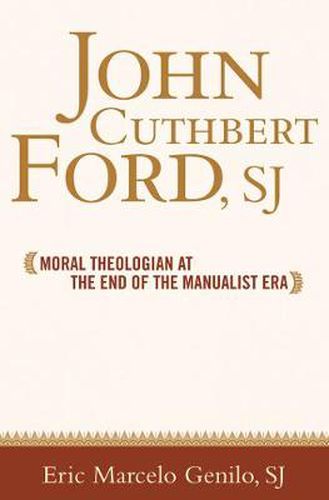Readings Newsletter
Become a Readings Member to make your shopping experience even easier.
Sign in or sign up for free!
You’re not far away from qualifying for FREE standard shipping within Australia
You’ve qualified for FREE standard shipping within Australia
The cart is loading…






John Cuthbert Ford, SJ (1902-1989) was one of the leading American Catholic moralists of the 20th century. This is the first full-length analysis of his work and influence, one that not only reveals a traditionally Catholic method of moral analysis but also illuminates the conflicts behind and development of Catholic moral teaching during the volatile 1960s. Ford is best known for his influential contribution to Catholic teachings on three moral issues. His objection to the Allied practice of obliteration bombing during WWII by drawing a sharp distinction between combatants and noncombatants is still studied widely today. Ford campaigned for alcohol education for both clergy and laity and introduced a pastoral approach for assisting and counselling alcoholics. As a member of the Papal Commission on Population, Family, and Birth Rate during the 1960s, Ford was an unyielding defender of the traditional Catholic teaching on birth control that still reigns today. Drawing on the published works and personal papers of Ford, Eric Genilo begins with a brief description of the theologian’s life, career, and influence. The book is divided into two parts. In Part I, Method, Genilo offers an overview of Ford’s moral theology in the manualist tradition - a 300-year period during which Catholic priests used manuals to instruct the faithful on matters of morality and sin. Genilo then examines Ford’s two modes of resolving moral cases and presents Ford’s approach to doctrinal development. In Part II, Moral Objectivity, Genilo shows how Ford confronted the growing situation ethics movement, then moves to how he understood freedom and subjective culpability, particularly in the case of alcoholism. Later chapters reveal Ford’s theological conflicts with Josef Fuchs, SJ on the issue of birth control, his staunch opposition to totalitarianism, and his moral analysis of how society should treat marginalized persons threatened by the abuse of power. Genilo concludes with an assessment of Ford’s legacy to the development and practice of moral theology, leaving the reader with an in-depth portrait of an extraordinary man who dedicated his life to defending the Church and protecting the most vulnerable persons in society.
$9.00 standard shipping within Australia
FREE standard shipping within Australia for orders over $100.00
Express & International shipping calculated at checkout
John Cuthbert Ford, SJ (1902-1989) was one of the leading American Catholic moralists of the 20th century. This is the first full-length analysis of his work and influence, one that not only reveals a traditionally Catholic method of moral analysis but also illuminates the conflicts behind and development of Catholic moral teaching during the volatile 1960s. Ford is best known for his influential contribution to Catholic teachings on three moral issues. His objection to the Allied practice of obliteration bombing during WWII by drawing a sharp distinction between combatants and noncombatants is still studied widely today. Ford campaigned for alcohol education for both clergy and laity and introduced a pastoral approach for assisting and counselling alcoholics. As a member of the Papal Commission on Population, Family, and Birth Rate during the 1960s, Ford was an unyielding defender of the traditional Catholic teaching on birth control that still reigns today. Drawing on the published works and personal papers of Ford, Eric Genilo begins with a brief description of the theologian’s life, career, and influence. The book is divided into two parts. In Part I, Method, Genilo offers an overview of Ford’s moral theology in the manualist tradition - a 300-year period during which Catholic priests used manuals to instruct the faithful on matters of morality and sin. Genilo then examines Ford’s two modes of resolving moral cases and presents Ford’s approach to doctrinal development. In Part II, Moral Objectivity, Genilo shows how Ford confronted the growing situation ethics movement, then moves to how he understood freedom and subjective culpability, particularly in the case of alcoholism. Later chapters reveal Ford’s theological conflicts with Josef Fuchs, SJ on the issue of birth control, his staunch opposition to totalitarianism, and his moral analysis of how society should treat marginalized persons threatened by the abuse of power. Genilo concludes with an assessment of Ford’s legacy to the development and practice of moral theology, leaving the reader with an in-depth portrait of an extraordinary man who dedicated his life to defending the Church and protecting the most vulnerable persons in society.